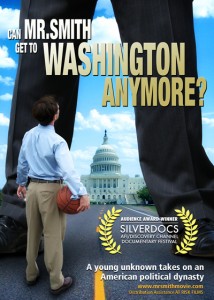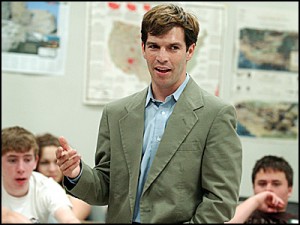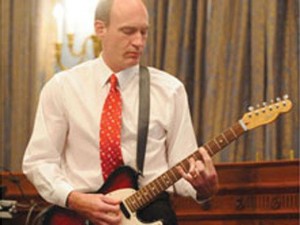Last Friday, in my role as a contributor to Politico’s “Arena”, I responded to a question about the presidential candidacy of guitar-playing, wise-cracking Michigan Congressman Thaddeus McCotter. Was there room for him in the Republican field?
Sure, I replied. He can join Newt Gingrich in filling the comic relief void. He starts out, I noted dryly, with national name ID approximating that of my dad.
Several people told me they found my remarks amusing. But as I had the chance to reflect over the weekend, I realized that – with all due respect to Mark Halperin – I was being a dick.
I disagree with most of what Thaddeus McCotter – who calls himself a true constitutional conservative – espouses, but people shouldn’t mock passionate, sincere candidates just because they are longshots. And of all people, I definitely shouldn’t mock them.
***
When I decided to run for Congress in 2004, I was a nobody: a 29 year-old adjunct lecturing at a local university while trying to complete my Ph.D. I had no money, no political base and no name; my staff was a ragtag crew of students. The leading candidate was Russ Carnahan, scion of Missouri’s most powerful political dynasty: the “Kennedys of Missouri.” Russ’s dad was a two-term Governor and his mom a U.S. Senator; my dad had been a golf coach, a sportswriter, a pool hustler, and adverstising copywriter, and my mom counseled children with special needs. Ten candidates filed; Carnahan led the field by 40 points.
I set two benchmarks for myself, one concrete, the other less so. The real benchmark was that I vowed to raise $100K in my first quarter, somehow.
The second benchmark was somewhat less scientific. One evening after teaching, I went across the street from campus and canvassed a neighborhood to see if people would take me seriously as a congressional candidate, or if they thought I looked too young (I was a boyish 29, 5’6” and 120 pounds soaking wet). I knocked on about 40 doors.
The first door was answered by a thirty-something woman who immediately after my introduction asked me point-blank if I was pro-choice. “Absolutely,” I said. She said she’d vote for me as long as I didn’t waver on that issue. I thought to myself, OK, there’s one vote, at least I won’t get shut out.
A few doors later an older man asked me if I supported stem-cell research. “Absolutely,” I said, and he said he was a genomic researcher and would back me as long as I supported the right to unfettered scientific research. Two for two. I can do this.
A few minutes later, a middle-aged woman opened her door, and I introduced myself. “Hi, my name’s Jeff Smith, and I’m planning to run for Congress next year, but just wanted to come by today and see if you have any questions for me.”
She looked at me quizzically. “Where are you coming from?”
“Uh, well, from campus, actually.”
“Oh, yes, you must want to see Janie. Hold on one second.” She called up the stairs, “Janie, come on downstairs, there’s a young man here who wants to talk to you, he’s running for Student Congress.”
“Tell him I’m busy, Mom,” came the disembodied voice of a college girl.
I was too embarrassed to explain myself. I said goodbye, walked back to campus, and started thinking of how I could raise $100K in 3 months, which I did, barely.
***
Thaddeus McCotter knows exactly what I realized back in 2003: Primaries are about finding niches. And the terrain he encounters is not unlike the one I faced nearly a decade ago: a crowded field, but one in which he can identify possible niches to fill.
I knew there would be at least seven candidates (ultimately there were ten), and with each candidate to enter, the race became that much more attractive to more candidates, given the declining percentage needed to win. I spent weeks looking at numbers, analyzing different combinations, figuring out if there was enough space for me to fill. I estimated that with seven candidates, one could win with just 28-29% of the vote, and that the entrance of another candidate or two could reduce that number to 23-24%. For me, every decline in this number made the race more appealing, because the fewer votes needed to win, the more important each vote became. And the increased importance of each vote magnified the influence of a grassroots campaign relative to a money-and-media-driven campaign.
Though there were formidable obstacles, I concluded there was a niche to fill in the race – actually, several of them.
First, there was a generational niche: the three leading candidates were approximately 45, 55, and 65. Second, there was an ideological niche: the frontrunner spoke about policy only in very broad generalities, and the other two leading candidates were life, anti-stem cell, anti-gay rights, and pro-gun. So, there was room for a strong progressive candidate with specific stances.
Third, there was a stylistic niche: we were the only campaign committed to and capable of running a true, old-fashioned grassroots campaign, powered by hundreds of volunteers willing to pound the pavement in a steamy St. Louis summer. Fourth, there was a geographic niche: I lived in the northwest corner of the district, and it was a happy coincidence that the northern third of the district was not only home to the candidate with the weakest geographic base, but was also the most progressive and youngest part of the district. So, the opportunity was there to layer niche over niche and potentially produce a groundswell, but it would not be easy.
McCotter, similarly, may be able to fill a few niches: he’s the youngest Republican hopeful and his guitar prowess could help attract voters under 45; he’ll stress reinvigorating our manufacturing base and target blue-collar Republicans and independents; he’s the only Republican candidate who is funny (intentionally). I can’t imagine that will be enough, even in a 10-person race, but I see what he’s thinking.
***
Just before publicly announcing my candidacy in late 2003, I went to my parents’ house for dinner; it was a tradition for my brother and I to go back home on Sunday nights in fall and winter for dinner with my parents and then bowling with my dad. This Sunday was a little different. I explained that I was planning to run for Congress, and everyone laughed.
“I’m serious, guys. I think I can win.”
“Um, OK, Beavis,” said my brother, and the whole table cracked up at his imitation of one of the characters from the 1990s cartoon featuring two moronic adolescents, Beavis and Butt-Head.
“You guys, seriously, I need you to give me contributions. Can you guys give me two thousand bucks?”
“Will that get me a personal dinner with the candidate?” asked my brother, and everyone was in stitches again.
“Listen, it’s not funny. I can win this thing. But I gotta raise a hundred thousand bucks in my first quarter in the race if I want people to take me seriously. And there’s no way I can get there if you guys aren’t all in for two thousand.” I knew that sounded cold, but everybody around that table could’ve given me two grand without feeling it too much.
My brother turned serious. “OK, if I give two grand now, can I get my money back as soon as other people put their money in?”
“No.”
“That’s ridiculous. There’s no way I’m doing that then. Total waste of money.”
My mom interjected. “Jeffrey, have you thought this through? This whole idea just seems preposterous. Why don’t you just finish your Ph.D.? Maybe you could try this after you‘re more established.”
“Mom, the seat’s open. It hasn’t been open for 28 years and it may not open up for another 28 years if Carnahan wins.”
“Carnahan?” asked my dad. “Didn’t he die in a plane crash?”
“It’s his son, Dad.” I was losing my patience. “Are you guys gonna give me any money or not?”
“Jeffrey,” said my mom haltingly, “I feel like running for this is just running away from finishing your Ph.D. You’re always running, you never slow down. Running around to do this thing or that thing. When does the running stop?”
My dad chimed in to agree with my mom, invoking his longtime best friend‘s view. “Sandy says the same thing. He says you’ve gotta get focused. Whether it’s being a professor or working in politics or doing TV commentary, he thinks you need to pick one and decide–”
 “I am picking! I’m running for Congress. Are you guys gonna help?”
“I am picking! I’m running for Congress. Are you guys gonna help?”
Silence.
“Uh, if you like, win and stuff, will you get Secret Service protection?” My 33- year-old brother was imitating Butt-Head again. Everyone cracked up.
I got up from the table. “OK, that’s cool. Forget I asked. I’ll get the money from other people.” I know I sounded like a petulant teenager that just got his request for the car keys denied, but I couldn’t help it. I just figured I’d have to work a little harder, show them that I could build support, and eventually they’d come aboard.
A few days later, I declared my candidacy. The media greeted my announcement with a deafening silence — a harbinger of the year to come, and an early taste of the frustration that would lead me to make perhaps the most consequential (and ill-considered) decisions of my life. Ultimately, I lost 22.9%-21.3%. My analysis had been close, and close left me as an adjunct lecturer with a half-finished dissertation and enough war stories to entertain a class.
***
I don’t know if Thaddeus McCotter has his family’s support, or if, upon telling people that he is running for President, any of them have replied, “President of what?” If that hasn’t happened yet, I can assure him that it will.
But I have to say, regardless of his far-right views, I’m kind of rooting for him. And I shouldn’t have disparaged him so condescendingly. I need to save my snark for the ones who really deserve it, like Gingrich and Romney.












Leave a Reply